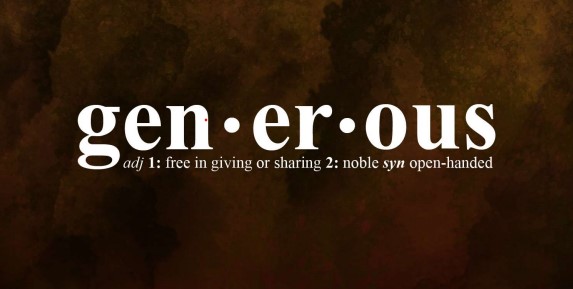
“Generous” comes from a Latin word meaning “of noble birth.” Generous used to refer to a class of people, “noble” people. These were the leaders, people who were supposed to be courageous, honorable, and committed to the common good. Over time, “generous” came to refer to a quality that anyone could possess, not only people from certain aristocratic families. It came to take on the meaning that we associate with it today: “open-handed, munificent, lavish, magnanimous, unselfish.”
However, there is still a hint of the original meaning in our present day use of “generous.” Unlike telling the truth or not stealing or not beating up your neighbor because the leaves from his tree are all over your lawn, being generous is not considered an obligation. Generosity is certainly admirable, but it is not generally considered to be “required.” Indeed, to make generosity an obligation would ruin it. Part of generosity is the desire to be generous. You’re not generous if you’re being coerced or only giving because you “have to.”
That doesn’t mean that we have to wait for the feeling to learn how to be generous, though. Just like learning to appreciate some foods or music takes time, it can take a little time to learn to be generous and to experience the benefits of being generous. So many messages in our culture tell us that we don’t have enough and that we need to hold on to everything we have. In other words, we are constantly told the lie that we can’t be generous because we can’t afford to give much away.
There is no question that is a lie. Yes, most of us worry about finances. That is especially true in times like the fall of 2022 when inflation is high for the first time since the 1980s, and people are wondering how they will pay increased costs. Yes, most of us feel so busy that we have no time to share. Yes, we sometimes feel like we just don’t have the energy even to spend time with our friends. But it is also true that when we are generous with our money, our time and our relationships, we are happier people. Christian Smith and Hilary Davidson in their book, The Paradox of Generosity: Giving We Receive, Grasping We Lose, show that generosity does improve our quality of life.
Smith and Davidson surveyed 2,000 people from all over the United States, did deep interviews of more than sixty people, and examined the communities in which these people lived. The data was clear. More generosity produced more happiness. Of course, this is not a magical or mechanical relationship. But it is real. For example, 38% of the people who give away 10% or more of their income report being “very happy,” and only 10% of people who give away 10% of their income report being “unhappy” or “very unhappy.” On the other hand, 28% people who did not give away 10% or more of their income reported being “very happy,” and 15% of the people in that group reported being “unhappy” or “very unhappy” (see Smith and Davidson, Chapter 1).
It’s important to state again that the relationship between generosity and happiness is not mechanical. Being generous is not a guarantee that you’ll be very happy. On the other hand, the link between generosity and
happiness isn’t really a surprise, either. After all the Bible — and many other sources of traditional wisdom — tell us that being generous is part of a good life, a blessed life. When we see others benefit from our gifts,
we naturally experience joy. Like all of the virtues, generosity promotes what many philosophers and theologians call “human flourishing” — better lives for and for the people around us. No wonder it makes us happier, too
